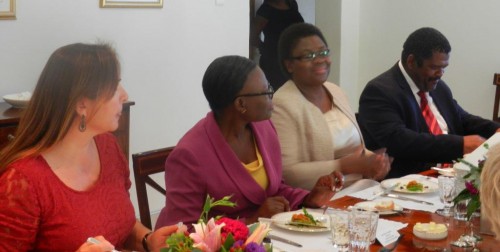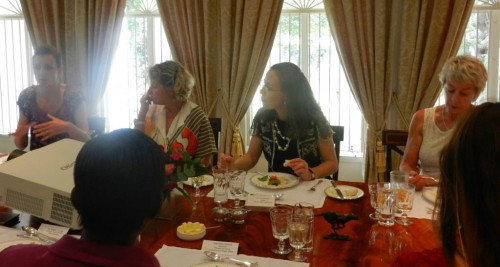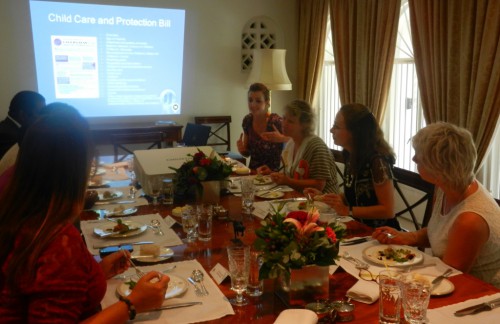6th March 2015 Windhoek, Namibia
Making it happen for International Women’s Day in Namibia
The theme of this year’s International Women’s Day is “Make It Happen”. Yesterday, I had the privilege to celebrate it in the presence of a group of impressive Namibian women who have all made it happen in their respective fields of diplomacy, financial services, media, human rights advocacy and government.

Joining me for a special lunchtime discussion on issues affecting women in Namibia today were Permanent Secretary for the Ministry of Foreign Affairs, Her Excellency Ambassador Selma Ashipala-Musavyi; Gwen Lister, founder of The Namibian newspaper and free media advocate; Nangula Uaandja, Senior Partner for Price Coopers Waterhouse and Business Woman of the Year 2013; Rachel Coomer, Public Outreach Manager for the Legal Assistance Centre; and my French and Turkish colleagues, HE Jacquline Bassa-Mazzoni and HE Deniz Cakar. We were also joined by two male colleagues, who seemed slightly in awe of the strong gathering of female leadership, but nevertheless contributed to what turned out to be a lively discussion.

International Women’s Day represents an opportunity to celebrate the achievements of women in our local communities and around the world, while calling for greater equality. Our discussions yesterday were beautifully shaped around Rachel’s fascinating presentation on “What it is like to be female in Namibia at 25 years of independence in Namibia”.
Rachel helps run the gender and advocacy work of Namibia’s Legal Assistance Centre, Namibia’s public interest law organisation that campaigns on local legal issues.

Her presentation was an education for us all.
551 laws have been made since Namibia gained its independence in 1990. A number of good laws have been put in place to address the country’s high levels of gender based violence. However, few have been family law reforms, meaning that women and children continue to be vulnerable. Draft bills that have not progressed for various reasons include: divorce, marital property, customary marriage and intestate inheritance. No bills have yet been drafted to tackle cohabitation and stalking.
Our discussions touched on proposals to introduce a minimum wage for domestic workers: were the rates proposed realistic, enough to live on, really going to cause redundancy rather than greater security as some news stories claimed? How would the plans impact those on both sides of the service transaction? We moved on to cover prospects to increase maternity leave from the current 3 month provision. How would this effect productivity levels? Would it help tackle the country’s social cohesion challenges? It was a rich and fascinating exchange of views and experiences on matters that directly impacted Namibian women’s ability to ‘make it happen’.
One very good piece of news that we were able to celebrate was yesterday’s passing of the Childcare and Protection Bill, which significantly strengthens the rights of children and provision of services to support them in Namibia.
Another big change on the horizon is the imminent swearing in of a new parliament, which will be made up of 42% female members on 20 March. This follows the introduction of mixed gender party lists for major Namibian political parties. This marks a major shakeup of the local political scene and significant step forward for women’s empowerment and equality in the southern African region.
Ambassador Selma Ashipala-Musavyi told us that major training was underway to help prepare the new incoming members of parliament to tackle their new legislative responsibilities effectively. I wish them well and look forward to engaging with them once the dust settles after Namibia’s Silver Jubilee Independence celebrations on 21 March and they start “Making It Happen” in their new roles!